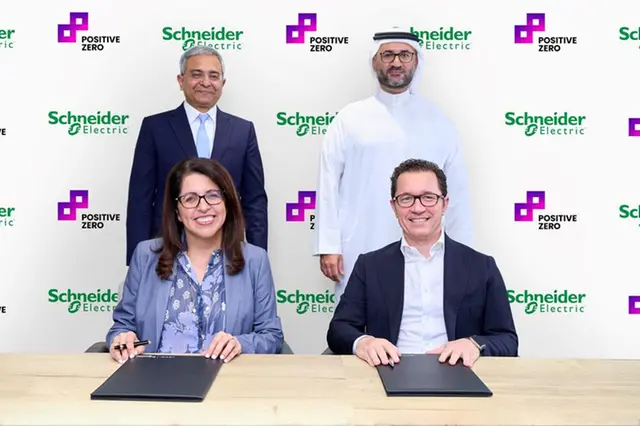Schneider Electric, a global leader in energy management and automation, and Positive Zero, a decentralised decarbonisation infrastructure business headquartered in the UAE, signed a Memorandum of Understanding (MOU) to drive the development of sustainable energy solutions. This collaborative effort aims to accelerate the adoption of clean energy technologies and propel the transition towards a net-zero future in the region.
As part of the agreement, Schneider Electric and Positive Zero will collaborate on various initiatives to advance decarbonization-as-service programs across the United Arab Emirates and the Sultanate of Oman. This includes exploring synergies across distributed microgrid projects, clean mobility solutions, energy efficiency, and sustainability.
David Auriau, CEO and Co-founder of Positive Zero, said: “Schneider Electric, one of the leading players worldwide, and Positive Zero are both positioned to address a new energy landscape, which is decentralized, flexible and connected. This collaboration represents a strategic alignment of our shared vision for decarbonization and sustainability. Positive Zero is dedicated to pioneering innovative solutions that contribute to a cleaner and more sustainable world, and our cooperation will accelerate this movement in the commercial and industrial sectors.”
Amel Chadli, President of Gulf Countries at Schneider Electric, stated: “We are looking forward to the outcomes of this collaboration with Positive Zero. It underscores another important step for Schneider Electric’s journey and commitment towards accelerating the energy transition in the region and empowering organizations and communities to embrace sustainable energy solutions.”
In December 2023, BlackRock, the world’s largest asset manager, announced its commitment to invest $400 million in Positive Zero through a diversified infrastructure fund.
The opportunity for advancing comprehensive corporate sustainability programs in the Middle East and North Africa (MENA) region is significant. According to the World Economic Forum’s (WEF) October 2023 insight report, “Closing the Climate Action Gap,” only 12% of businesses in MENA have committed to net-zero targets and just 6% have published clear road maps to achieve those goals. The report asserts that the GCC countries have more resources and lower costs to reduce carbon emissions using energy efficiency and solar power solutions, giving the region significant advantages over comparable countries in North America and the European Union.
Meanwhile, a January 2024 report by SkyQuest Technology forecasts that the global Energy-as-a-Service market will exceed $112 billion by 2030 with a CAGR of 9.1% between 2023-2030. This includes the adoption of distributed energy resources like off-grid solar power and mobile battery storage, microgrid technologies, the integration of Artificial Intelligence (AI) and Machine Learning (ML) for predictive energy analytics, and other green and sustainable solutions.

